Activities to Avoid in Thailand
Posted by Ariane on Apr 15, 2014 in Countries, Thailand | 0 comments
Summary: Though Thailand is a great country to visit and a favorite backpacker destination, it is also the country where everything can be transformed by money and business. We found that some of the popular things to do in Thailand are very unethical, and have decided to share our research and let people know about the truth behind some attractive forms of entertainment.
Unethical Activities One Should Avoid in Thailand
We’ve been to Thailand many times, but now that we are full-time travellers we actually have a different perspective about what we see, and we tend to approach things we want to experience in a country with more ethical principles (as much as we can).
The two main targets for unethical tourism in Thailand (and elsewhere I suppose) are people and animals.
Animal Mistreatment
We are wildlife lovers, and the more we see animals free in their natural environment, the more we boycott zoos (except for those that are parts of programs to rehabilitate mistreated animals, or protect endangered ones) and other similar establishments. In Thailand, you will find many activities or tours that include animal farms or shows.
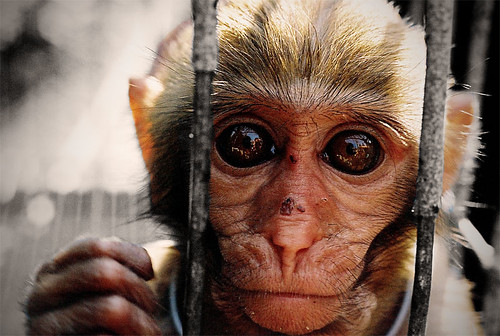
A monkey in cage by Samantha on Flickr
Crocodile and snake farms
In these places you will see animals caged or confined in enclosures. They are taken out several times per day for the purpose of performing a show in front of tourists. In both cases, the crocodile and snakes are molested in order for the trainer to show his bravery. In snake farms, they also milk the snakes to produce anti-venom medicines. Still, in our opinion this is abuse, as animals are forced to act in an unnatural way.
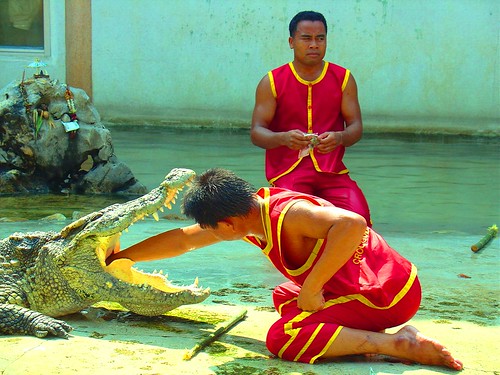
Crocodile show by Thai Jasmine on Flickr
Monkey and elephant shows
In most of these places animals are maintained in poor condition, caged or tied all the time, and sometimes they are tortured and starved. They have to perform in front of tourists, doing things such as riding bikes, drawing, playing football, etc., and if they don’t perform they are punished. Animals don’t play football or draw unless they are forced to do so!
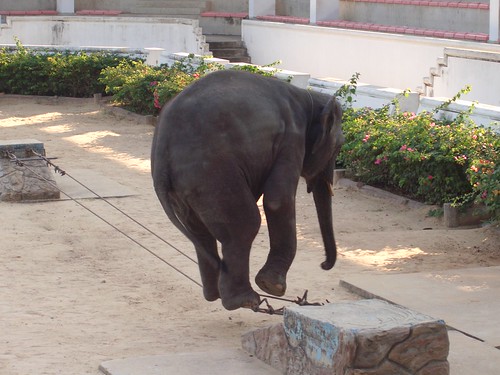
Elephant show by Will Ellis on Flickr
For more information:
- http://www.tripadvisor.com.my/ShowUserReviews-g293920-d623808-r65232145-Island_Safari-Phuke.html
- http://www.tripadvisor.com.my/ShowUserReviews-g1179396-d1490096-r62393619-Samui_Monkey_Theatre-Bophut_Ko_Samui_Surat_Thani_Provinc.html
Elephant treks and ride
Who doesn’t want to ride an elephant in Thailand? Riding an elephant may seem a very harmless activity, as the first thing that comes to mind is that the elephant is so strong that he will barely feel the weight on his back.
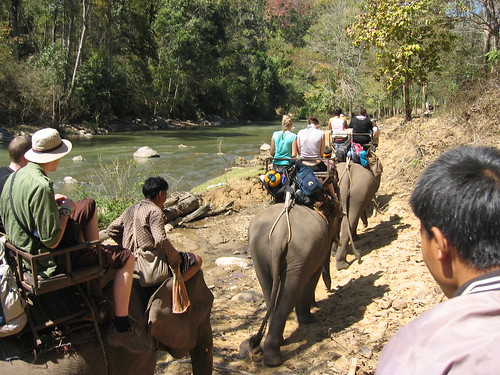
Elephant trekking by Tammy Nicholson on Flickr
But what people don’t know is that:
- In order to let someone on its back, the elephant went through a very harsh “training” called “crushing” or “phajaan,” which consist of separating the elephant from its spirit (according to the Thai ancestral belief). Babies are usually captured and taken from their mother in the wild and then tortured as they are trained. Elephants are not like dogs and don’t obey humans naturally.
- The weight of the chair you’re sitting on can be up to 100kg / 220 pounds, plus the weight of the people. Even sitting on the elephant’s neck can injure it, as its spine can’t bear a perpetual weight day after day for many years. This would be like if you had a weight on your neck all day long—even if the weight was not much, after years you would suffer from spine injuries.

Animal abuse by Robert Schrader on Flickr
For more information:
If you choose to experience one of these activities, you are supporting these unethical establishments with your money. Before hopping on a tour, check on the Internet, where you will find reliable reviews from people and NGOs.
Better options exist:
If you want to see elephants and interact with them without hurting them, it is possible to do so in Chiang Mai at the Elephant Nature Park, where they use your money to take care of rescued elephants that were mistreated in other parks or by perverse owners. You are not allowed to ride on their backs, but you can feed them and see them roaming freely in the park. You can even bathe them!
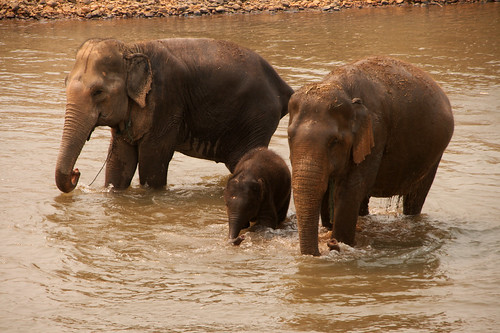
Elephant Nature Park by Christian Haugen on Flickr
For more information:
- http://www.huffingtonpost.com/charli-moore/elephants-thailand-spotlight-ethical-tour_b_4591638.html
- http://www.neverendingvoyage.com/25-random-observations-thai-elephants/
Human Trafficking
Unfortunately, not only animals are victims of unethical tourism in Thailand, but also people—and as usual, women come first. The fact that Thailand is one of the most popular sex tourism destinations is known all around the world. We are not judging tourists having relations with Thai girls or boys, as sometimes both parties find their own benefits and are happy with this kind of relationship. It is up to them to decide if this is right or wrong. The problem we have is with the sex industry and human trafficking trade.

Sex tourism in Thailand by Dave Phillips on Flickr
“Ping pong show” and other sex performance shows
Sometimes in Thailand things go way past the line of decency, especially when it comes to sex performance shows that often involve people coming from neighboring countries like Burma. These are often illegal immigrants to Thailand and are forced to become sex workers.
The “ping pong” show is one of the most degrading shows that women are expected to perform in order to please tourists and satiate their perverse sexual greed.
Unfortunately, sex tourism in Thailand is what most brings foreigners (that includes Europeans, North Americans, Australians, Middle Easterners, Japanese, Chinese, and Indians) to the country. One shouldn’t forget that sex tourism also involves children in some countries.
Even if you attend the show just out of curiosity (as many people do, I suppose), you support this degrading business with your money.
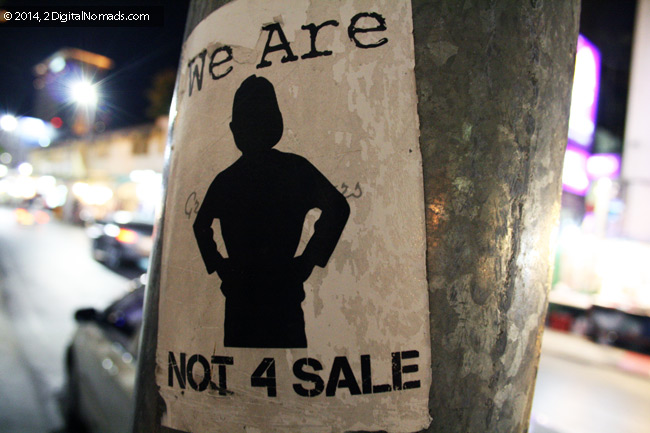
In the street in Chiang Mai
For more information:
- http://www.huffingtonpost.com/wires/2009/08/14/thailand-the-worlds-sex-t_ws_259562.html
- http://en.wikipedia.org/wiki/Ping_pong_show
Cultural activities
This is a less serious concern, though controversial and disturbing to some extent. In northern Thailand you will find tours that include visits to hill tribe villages (such as the long neck women villages). In these villages, people are not always free to do whatever they want, or even to move from the village. They are often refugees from Burma without papers and are used by the tourism industry to attract people and make money. The good thing is that for most of them it is better to be safe in Thailand even with restricted freedom than to be under a permanent threat in their home country. The controversial part is whether or not they should be used by the Thai tourism industry that way. You will never know how much of the money you pay for the tour actually goes to the local people.
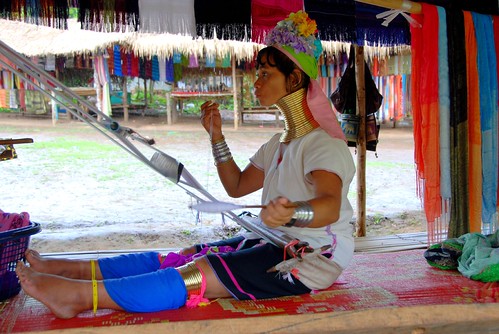
Long Neck woman by Pierre Pouliquin on Flickr
For more information:
In conclusion, I would say that because mass tourism and travel are two activities that are expanding, it is our duty to inform people about the consequences of ignoring what lies behind the choices they make. As a matter of fact, we typically make wrong choices because of our unawareness or ignorance, rather than on purpose. We used to ride elephants during our previous visits to Thailand because at that time we didn’t know what we know now. Traveling and visiting different countries is something we will always support, as it is a good way to be open-minded and to understand the world. But mass tourism involves so much money that it is also a very harmful industry in matters of the environment and human rights. So let’s be responsible tourists or travelers. There is always a better option that one should consider before making a wrong choice. Countries like Thailand have so much to offer, so you don’t have to give your money to the bad guys instead of the people who really deserve it.
Let’s be optimistic:
If there is no demand, there is no market

 Bassel & Ariane, a couple who quit their jobs to realize their dream "traveling around the world". This travel website is our way to share with you the amazing adventures we have had, with the goal of helping to make your own travels more enjoyable.
Bassel & Ariane, a couple who quit their jobs to realize their dream "traveling around the world". This travel website is our way to share with you the amazing adventures we have had, with the goal of helping to make your own travels more enjoyable.